ACC3005 Tax Law Assignment: Trading Stock and Spare Parts
VerifiedAdded on 2020/03/16
|8
|1720
|72
Homework Assignment
AI Summary
This assignment, prepared for ACC3005, focuses on Australian tax law concerning trading stock. It presents two case studies. The first examines a business dealing with gazebos and chairs, addressing the classification of these items as trading stock, valuation methods, and the treatment of obsolete stock according to the Income Tax Assessment Act 1997. The analysis includes calculations of closing stock values and considers the impact of market selling prices versus replacement costs. The second case study involves a business selling and servicing computers, focusing on whether spare parts are considered trading stock, especially in the context of maintenance agreements and leasing arrangements. The assignment explores the legal provisions and precedents that determine the classification of spare parts and their valuation, providing insights into tax compliance for businesses in similar situations. The assignment uses references to relevant legislation, rulings, and academic sources.
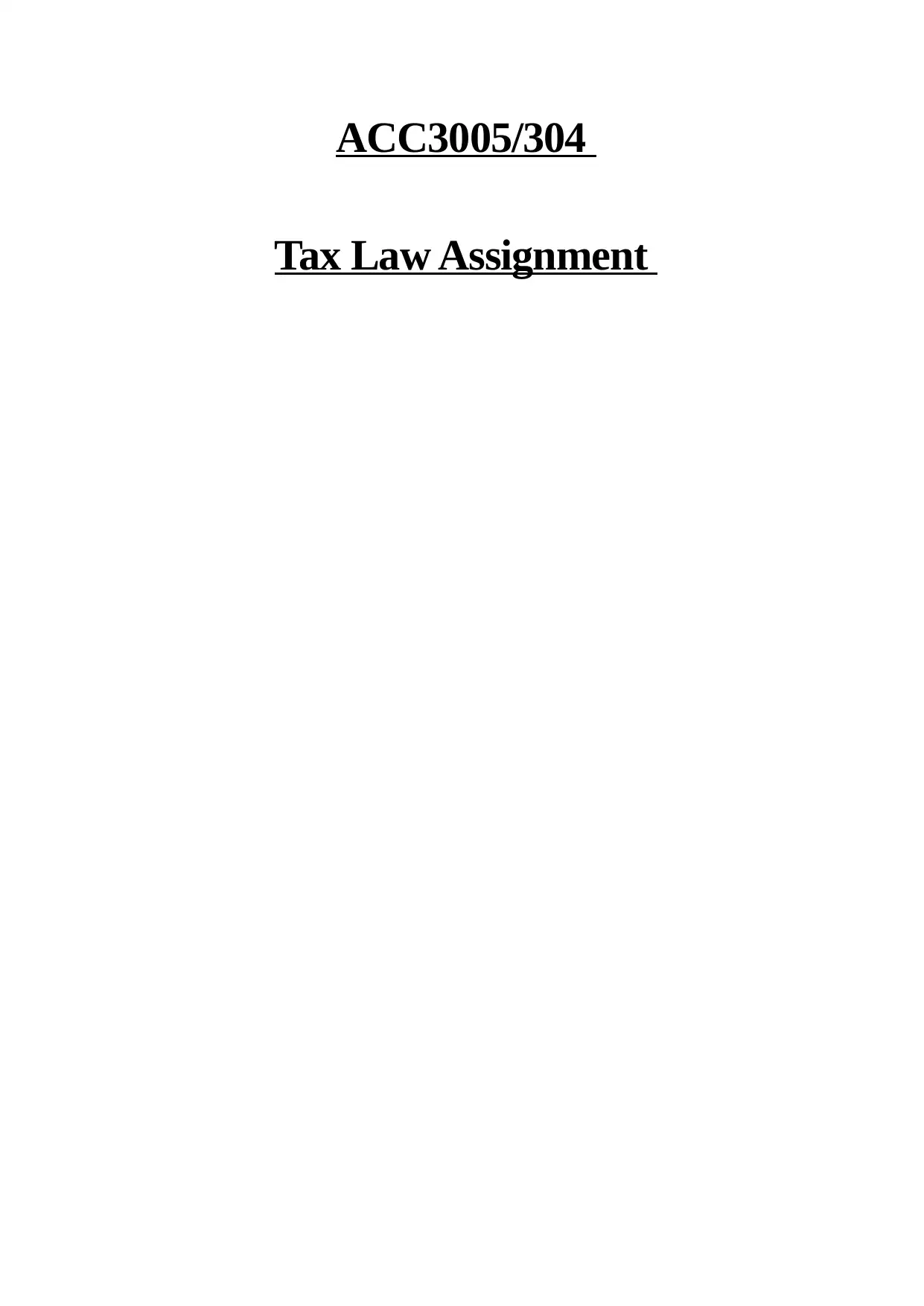
ACC3005/304
Tax Law Assignment
Tax Law Assignment
Paraphrase This Document
Need a fresh take? Get an instant paraphrase of this document with our AI Paraphraser
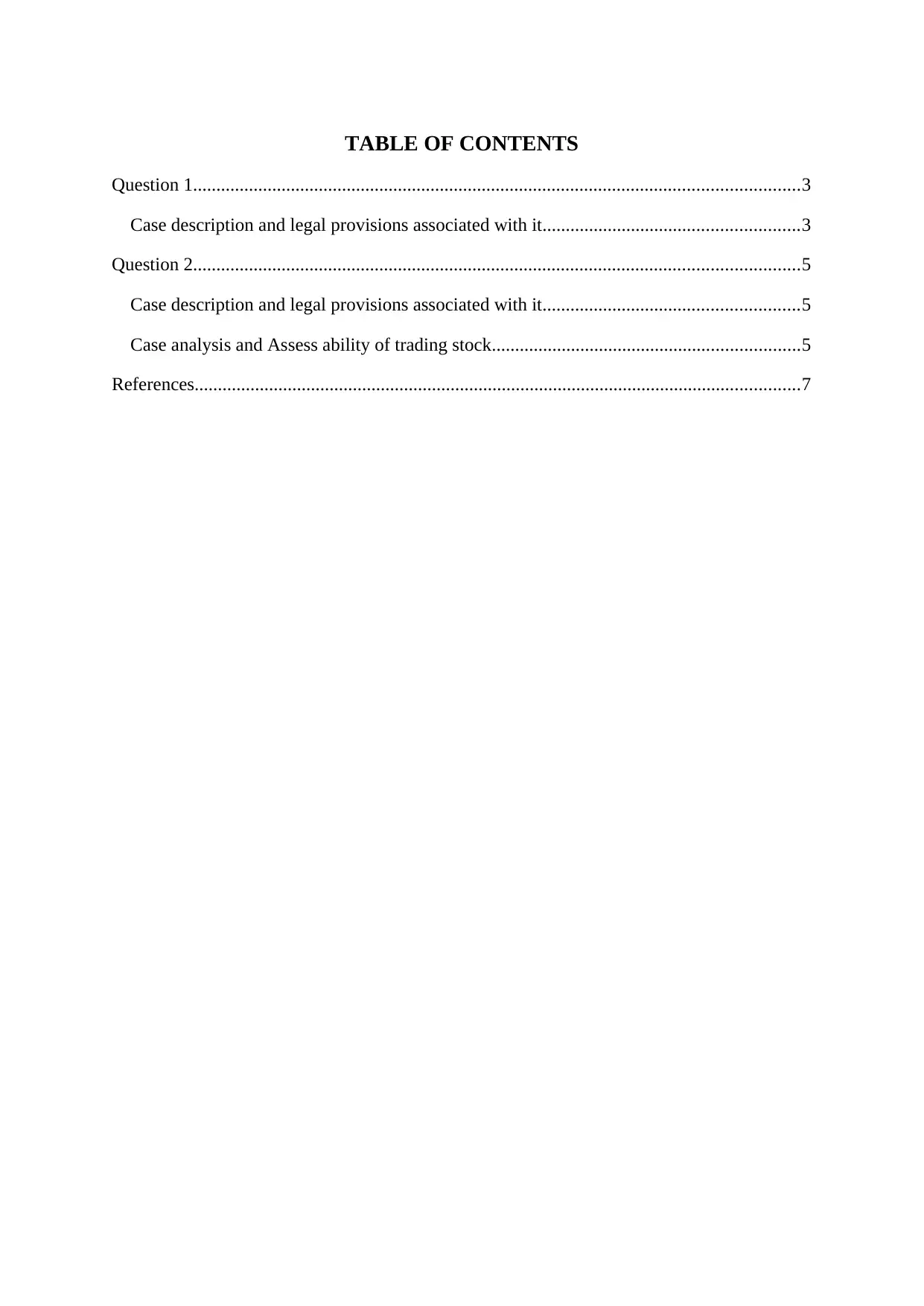
TABLE OF CONTENTS
Question 1..................................................................................................................................3
Case description and legal provisions associated with it.......................................................3
Question 2..................................................................................................................................5
Case description and legal provisions associated with it.......................................................5
Case analysis and Assess ability of trading stock..................................................................5
References..................................................................................................................................7
Question 1..................................................................................................................................3
Case description and legal provisions associated with it.......................................................3
Question 2..................................................................................................................................5
Case description and legal provisions associated with it.......................................................5
Case analysis and Assess ability of trading stock..................................................................5
References..................................................................................................................................7
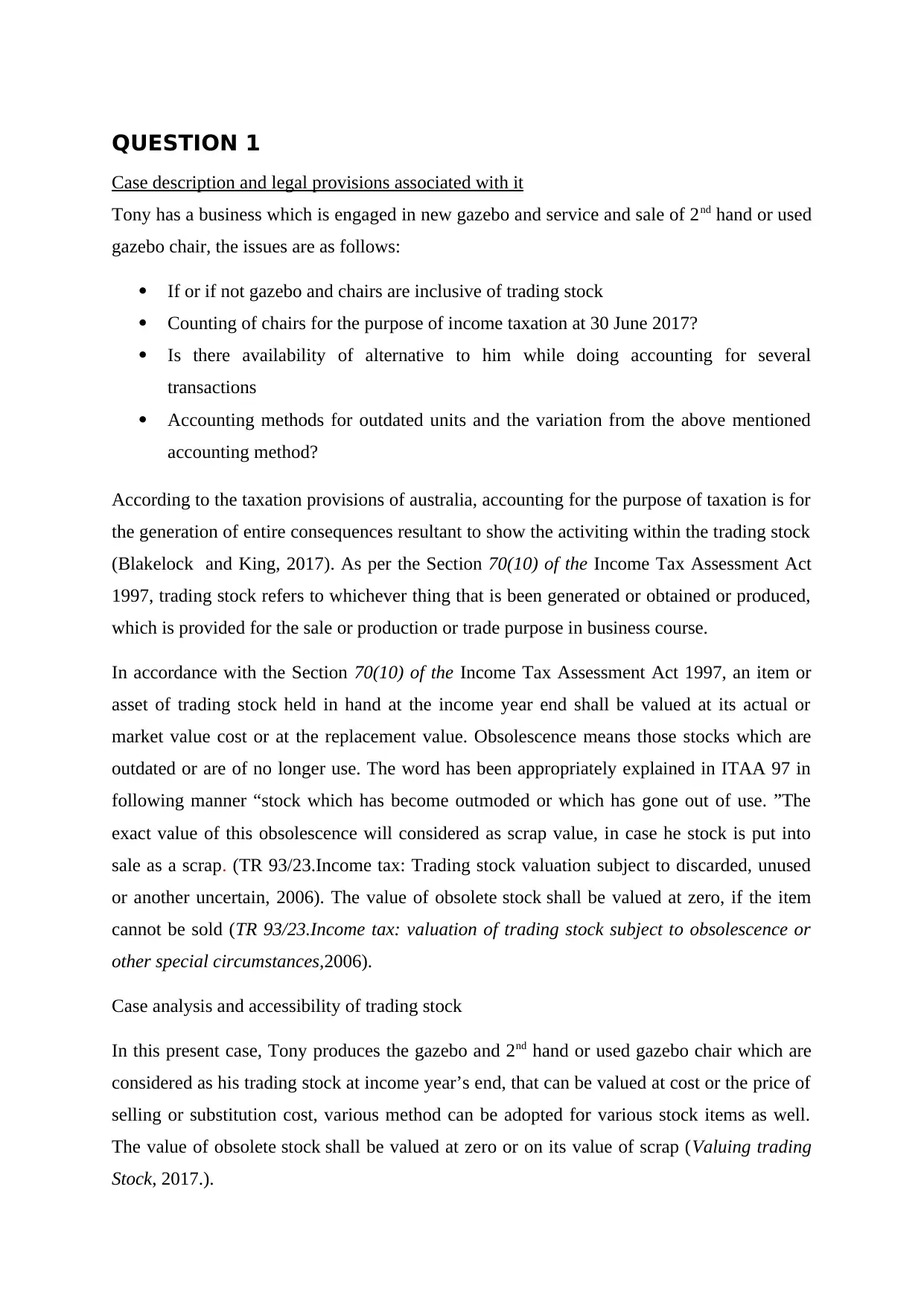
QUESTION 1
Case description and legal provisions associated with it
Tony has a business which is engaged in new gazebo and service and sale of 2nd hand or used
gazebo chair, the issues are as follows:
If or if not gazebo and chairs are inclusive of trading stock
Counting of chairs for the purpose of income taxation at 30 June 2017?
Is there availability of alternative to him while doing accounting for several
transactions
Accounting methods for outdated units and the variation from the above mentioned
accounting method?
According to the taxation provisions of australia, accounting for the purpose of taxation is for
the generation of entire consequences resultant to show the activiting within the trading stock
(Blakelock and King, 2017). As per the Section 70(10) of the Income Tax Assessment Act
1997, trading stock refers to whichever thing that is been generated or obtained or produced,
which is provided for the sale or production or trade purpose in business course.
In accordance with the Section 70(10) of the Income Tax Assessment Act 1997, an item or
asset of trading stock held in hand at the income year end shall be valued at its actual or
market value cost or at the replacement value. Obsolescence means those stocks which are
outdated or are of no longer use. The word has been appropriately explained in ITAA 97 in
following manner “stock which has become outmoded or which has gone out of use. ”The
exact value of this obsolescence will considered as scrap value, in case he stock is put into
sale as a scrap. (TR 93/23.Income tax: Trading stock valuation subject to discarded, unused
or another uncertain, 2006). The value of obsolete stock shall be valued at zero, if the item
cannot be sold (TR 93/23.Income tax: valuation of trading stock subject to obsolescence or
other special circumstances,2006).
Case analysis and accessibility of trading stock
In this present case, Tony produces the gazebo and 2nd hand or used gazebo chair which are
considered as his trading stock at income year’s end, that can be valued at cost or the price of
selling or substitution cost, various method can be adopted for various stock items as well.
The value of obsolete stock shall be valued at zero or on its value of scrap (Valuing trading
Stock, 2017.).
Case description and legal provisions associated with it
Tony has a business which is engaged in new gazebo and service and sale of 2nd hand or used
gazebo chair, the issues are as follows:
If or if not gazebo and chairs are inclusive of trading stock
Counting of chairs for the purpose of income taxation at 30 June 2017?
Is there availability of alternative to him while doing accounting for several
transactions
Accounting methods for outdated units and the variation from the above mentioned
accounting method?
According to the taxation provisions of australia, accounting for the purpose of taxation is for
the generation of entire consequences resultant to show the activiting within the trading stock
(Blakelock and King, 2017). As per the Section 70(10) of the Income Tax Assessment Act
1997, trading stock refers to whichever thing that is been generated or obtained or produced,
which is provided for the sale or production or trade purpose in business course.
In accordance with the Section 70(10) of the Income Tax Assessment Act 1997, an item or
asset of trading stock held in hand at the income year end shall be valued at its actual or
market value cost or at the replacement value. Obsolescence means those stocks which are
outdated or are of no longer use. The word has been appropriately explained in ITAA 97 in
following manner “stock which has become outmoded or which has gone out of use. ”The
exact value of this obsolescence will considered as scrap value, in case he stock is put into
sale as a scrap. (TR 93/23.Income tax: Trading stock valuation subject to discarded, unused
or another uncertain, 2006). The value of obsolete stock shall be valued at zero, if the item
cannot be sold (TR 93/23.Income tax: valuation of trading stock subject to obsolescence or
other special circumstances,2006).
Case analysis and accessibility of trading stock
In this present case, Tony produces the gazebo and 2nd hand or used gazebo chair which are
considered as his trading stock at income year’s end, that can be valued at cost or the price of
selling or substitution cost, various method can be adopted for various stock items as well.
The value of obsolete stock shall be valued at zero or on its value of scrap (Valuing trading
Stock, 2017.).
⊘ This is a preview!⊘
Do you want full access?
Subscribe today to unlock all pages.

Trusted by 1+ million students worldwide
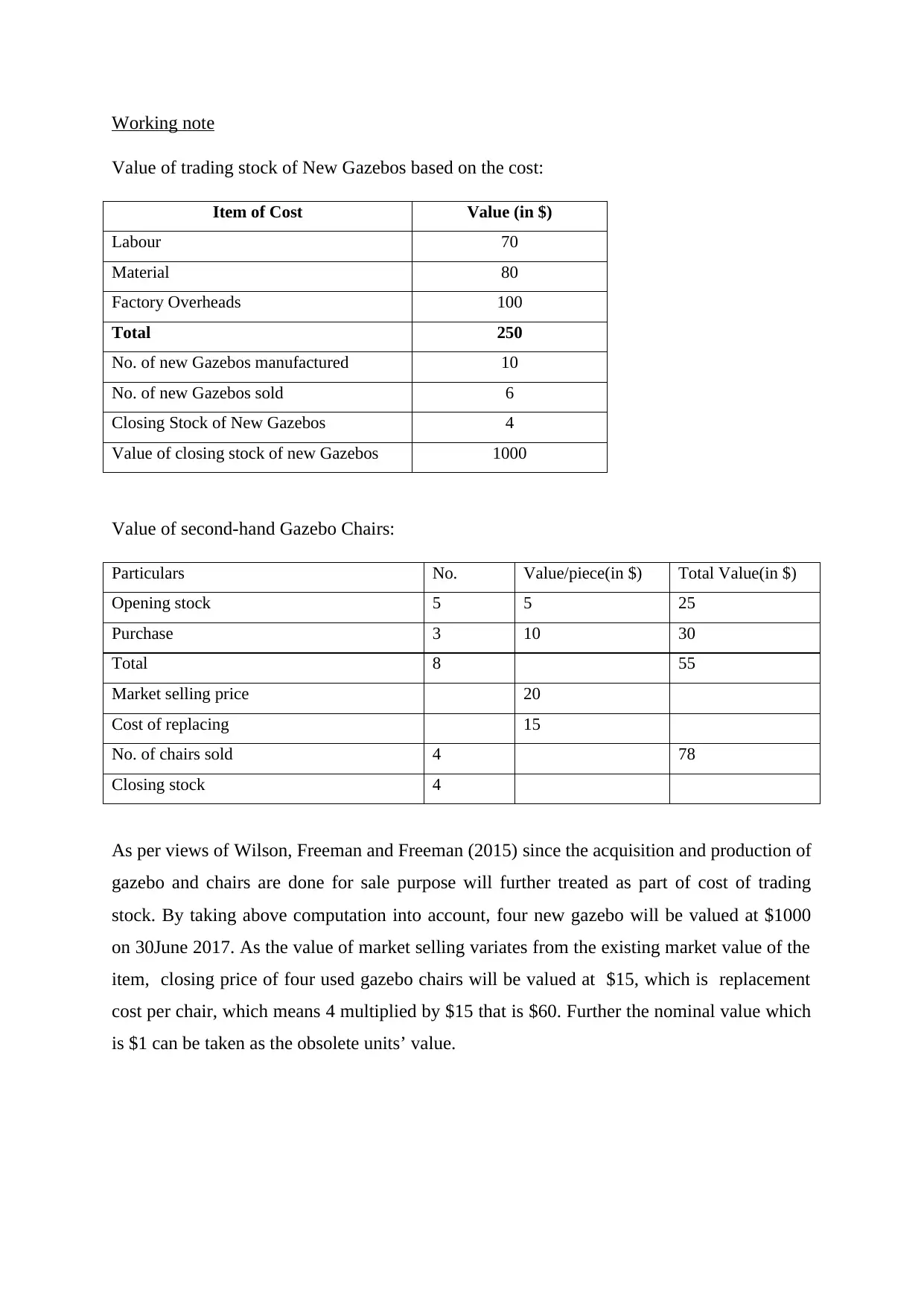
Working note
Value of trading stock of New Gazebos based on the cost:
Item of Cost Value (in $)
Labour 70
Material 80
Factory Overheads 100
Total 250
No. of new Gazebos manufactured 10
No. of new Gazebos sold 6
Closing Stock of New Gazebos 4
Value of closing stock of new Gazebos 1000
Value of second-hand Gazebo Chairs:
Particulars No. Value/piece(in $) Total Value(in $)
Opening stock 5 5 25
Purchase 3 10 30
Total 8 55
Market selling price 20
Cost of replacing 15
No. of chairs sold 4 78
Closing stock 4
As per views of Wilson, Freeman and Freeman (2015) since the acquisition and production of
gazebo and chairs are done for sale purpose will further treated as part of cost of trading
stock. By taking above computation into account, four new gazebo will be valued at $1000
on 30June 2017. As the value of market selling variates from the existing market value of the
item, closing price of four used gazebo chairs will be valued at $15, which is replacement
cost per chair, which means 4 multiplied by $15 that is $60. Further the nominal value which
is $1 can be taken as the obsolete units’ value.
Value of trading stock of New Gazebos based on the cost:
Item of Cost Value (in $)
Labour 70
Material 80
Factory Overheads 100
Total 250
No. of new Gazebos manufactured 10
No. of new Gazebos sold 6
Closing Stock of New Gazebos 4
Value of closing stock of new Gazebos 1000
Value of second-hand Gazebo Chairs:
Particulars No. Value/piece(in $) Total Value(in $)
Opening stock 5 5 25
Purchase 3 10 30
Total 8 55
Market selling price 20
Cost of replacing 15
No. of chairs sold 4 78
Closing stock 4
As per views of Wilson, Freeman and Freeman (2015) since the acquisition and production of
gazebo and chairs are done for sale purpose will further treated as part of cost of trading
stock. By taking above computation into account, four new gazebo will be valued at $1000
on 30June 2017. As the value of market selling variates from the existing market value of the
item, closing price of four used gazebo chairs will be valued at $15, which is replacement
cost per chair, which means 4 multiplied by $15 that is $60. Further the nominal value which
is $1 can be taken as the obsolete units’ value.
Paraphrase This Document
Need a fresh take? Get an instant paraphrase of this document with our AI Paraphraser
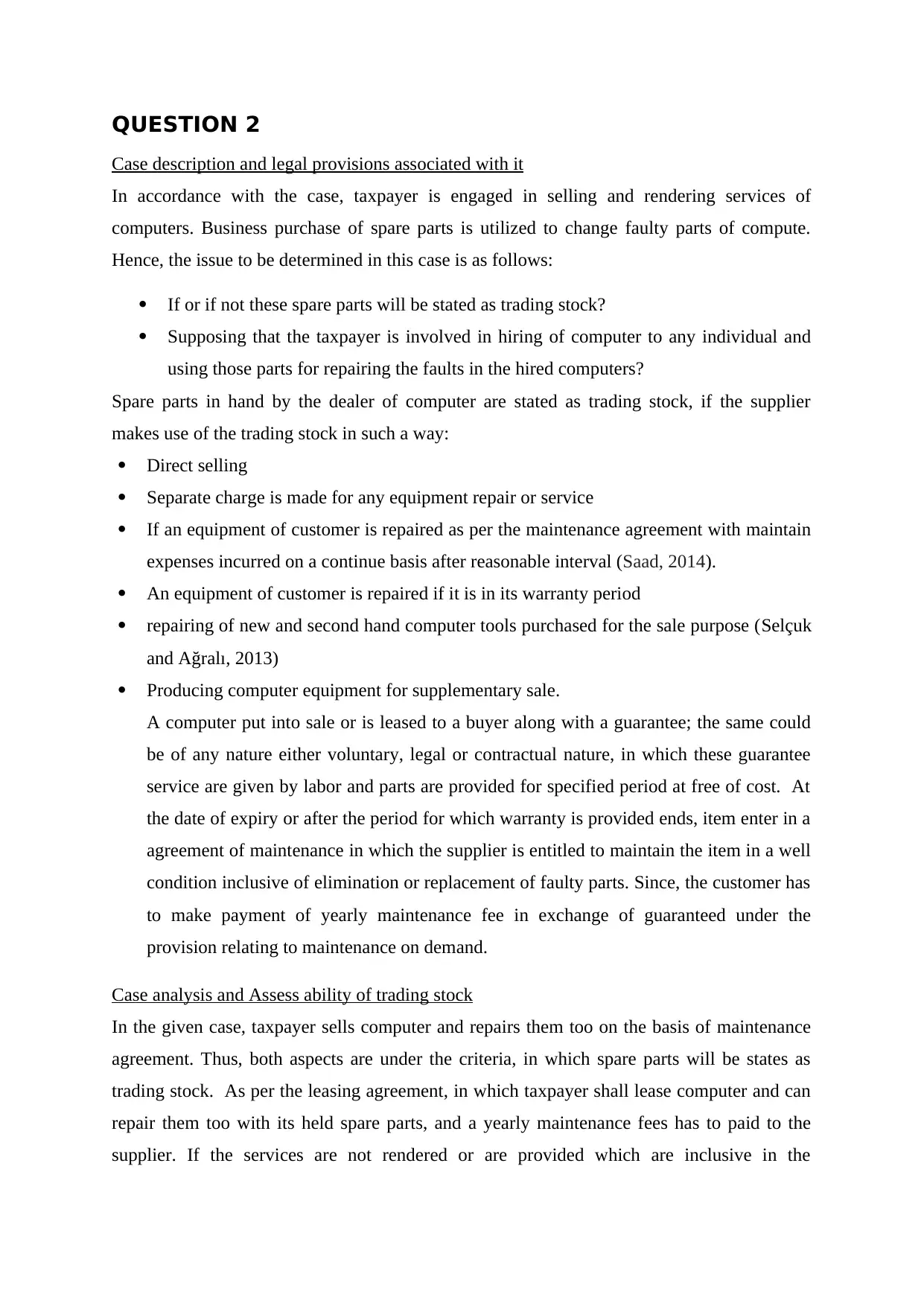
QUESTION 2
Case description and legal provisions associated with it
In accordance with the case, taxpayer is engaged in selling and rendering services of
computers. Business purchase of spare parts is utilized to change faulty parts of compute.
Hence, the issue to be determined in this case is as follows:
If or if not these spare parts will be stated as trading stock?
Supposing that the taxpayer is involved in hiring of computer to any individual and
using those parts for repairing the faults in the hired computers?
Spare parts in hand by the dealer of computer are stated as trading stock, if the supplier
makes use of the trading stock in such a way:
Direct selling
Separate charge is made for any equipment repair or service
If an equipment of customer is repaired as per the maintenance agreement with maintain
expenses incurred on a continue basis after reasonable interval (Saad, 2014).
An equipment of customer is repaired if it is in its warranty period
repairing of new and second hand computer tools purchased for the sale purpose (Selçuk
and Ağralı, 2013)
Producing computer equipment for supplementary sale.
A computer put into sale or is leased to a buyer along with a guarantee; the same could
be of any nature either voluntary, legal or contractual nature, in which these guarantee
service are given by labor and parts are provided for specified period at free of cost. At
the date of expiry or after the period for which warranty is provided ends, item enter in a
agreement of maintenance in which the supplier is entitled to maintain the item in a well
condition inclusive of elimination or replacement of faulty parts. Since, the customer has
to make payment of yearly maintenance fee in exchange of guaranteed under the
provision relating to maintenance on demand.
Case analysis and Assess ability of trading stock
In the given case, taxpayer sells computer and repairs them too on the basis of maintenance
agreement. Thus, both aspects are under the criteria, in which spare parts will be states as
trading stock. As per the leasing agreement, in which taxpayer shall lease computer and can
repair them too with its held spare parts, and a yearly maintenance fees has to paid to the
supplier. If the services are not rendered or are provided which are inclusive in the
Case description and legal provisions associated with it
In accordance with the case, taxpayer is engaged in selling and rendering services of
computers. Business purchase of spare parts is utilized to change faulty parts of compute.
Hence, the issue to be determined in this case is as follows:
If or if not these spare parts will be stated as trading stock?
Supposing that the taxpayer is involved in hiring of computer to any individual and
using those parts for repairing the faults in the hired computers?
Spare parts in hand by the dealer of computer are stated as trading stock, if the supplier
makes use of the trading stock in such a way:
Direct selling
Separate charge is made for any equipment repair or service
If an equipment of customer is repaired as per the maintenance agreement with maintain
expenses incurred on a continue basis after reasonable interval (Saad, 2014).
An equipment of customer is repaired if it is in its warranty period
repairing of new and second hand computer tools purchased for the sale purpose (Selçuk
and Ağralı, 2013)
Producing computer equipment for supplementary sale.
A computer put into sale or is leased to a buyer along with a guarantee; the same could
be of any nature either voluntary, legal or contractual nature, in which these guarantee
service are given by labor and parts are provided for specified period at free of cost. At
the date of expiry or after the period for which warranty is provided ends, item enter in a
agreement of maintenance in which the supplier is entitled to maintain the item in a well
condition inclusive of elimination or replacement of faulty parts. Since, the customer has
to make payment of yearly maintenance fee in exchange of guaranteed under the
provision relating to maintenance on demand.
Case analysis and Assess ability of trading stock
In the given case, taxpayer sells computer and repairs them too on the basis of maintenance
agreement. Thus, both aspects are under the criteria, in which spare parts will be states as
trading stock. As per the leasing agreement, in which taxpayer shall lease computer and can
repair them too with its held spare parts, and a yearly maintenance fees has to paid to the
supplier. If the services are not rendered or are provided which are inclusive in the
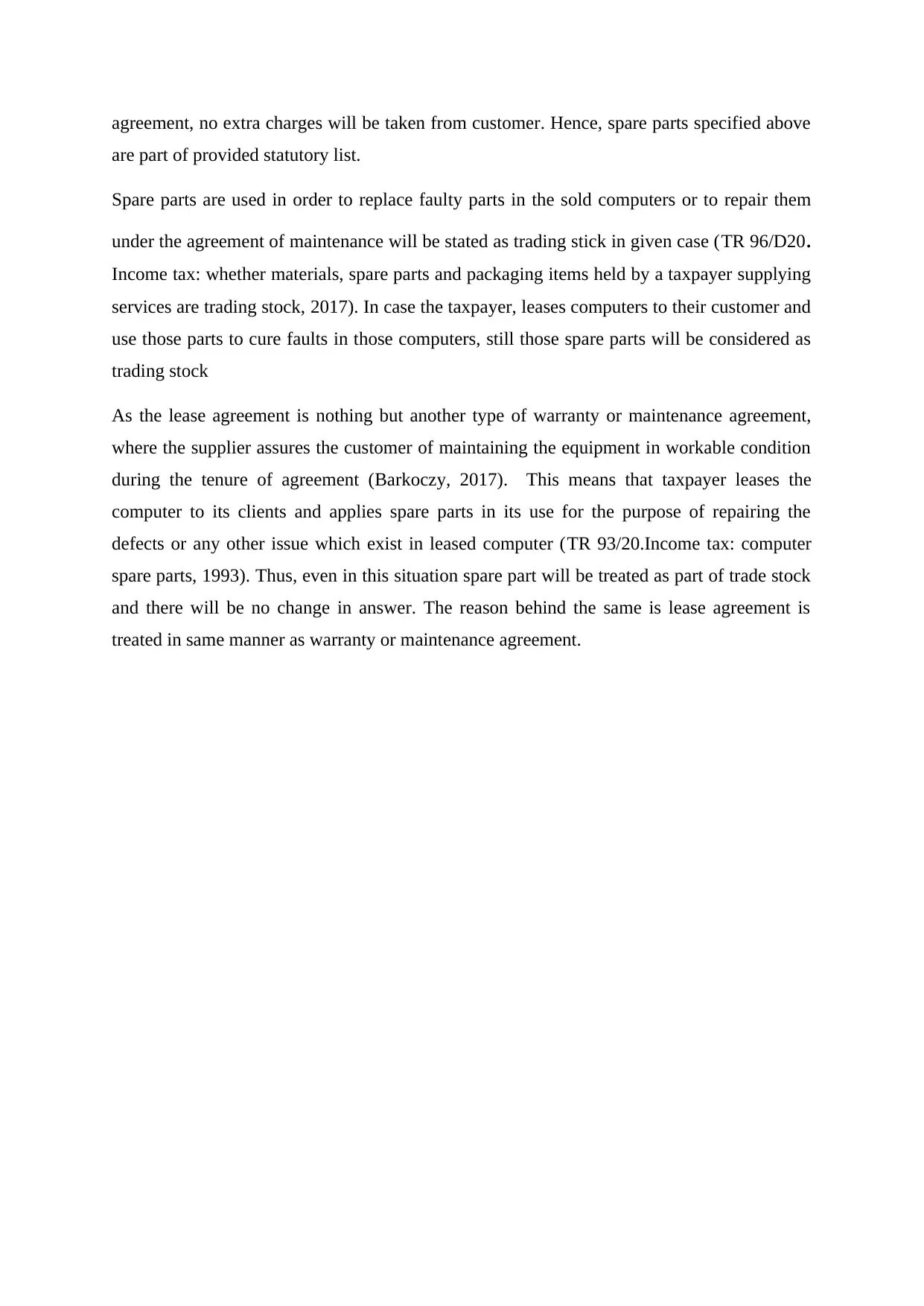
agreement, no extra charges will be taken from customer. Hence, spare parts specified above
are part of provided statutory list.
Spare parts are used in order to replace faulty parts in the sold computers or to repair them
under the agreement of maintenance will be stated as trading stick in given case (TR 96/D20.
Income tax: whether materials, spare parts and packaging items held by a taxpayer supplying
services are trading stock, 2017). In case the taxpayer, leases computers to their customer and
use those parts to cure faults in those computers, still those spare parts will be considered as
trading stock
As the lease agreement is nothing but another type of warranty or maintenance agreement,
where the supplier assures the customer of maintaining the equipment in workable condition
during the tenure of agreement (Barkoczy, 2017). This means that taxpayer leases the
computer to its clients and applies spare parts in its use for the purpose of repairing the
defects or any other issue which exist in leased computer (TR 93/20.Income tax: computer
spare parts, 1993). Thus, even in this situation spare part will be treated as part of trade stock
and there will be no change in answer. The reason behind the same is lease agreement is
treated in same manner as warranty or maintenance agreement.
are part of provided statutory list.
Spare parts are used in order to replace faulty parts in the sold computers or to repair them
under the agreement of maintenance will be stated as trading stick in given case (TR 96/D20.
Income tax: whether materials, spare parts and packaging items held by a taxpayer supplying
services are trading stock, 2017). In case the taxpayer, leases computers to their customer and
use those parts to cure faults in those computers, still those spare parts will be considered as
trading stock
As the lease agreement is nothing but another type of warranty or maintenance agreement,
where the supplier assures the customer of maintaining the equipment in workable condition
during the tenure of agreement (Barkoczy, 2017). This means that taxpayer leases the
computer to its clients and applies spare parts in its use for the purpose of repairing the
defects or any other issue which exist in leased computer (TR 93/20.Income tax: computer
spare parts, 1993). Thus, even in this situation spare part will be treated as part of trade stock
and there will be no change in answer. The reason behind the same is lease agreement is
treated in same manner as warranty or maintenance agreement.
⊘ This is a preview!⊘
Do you want full access?
Subscribe today to unlock all pages.

Trusted by 1+ million students worldwide
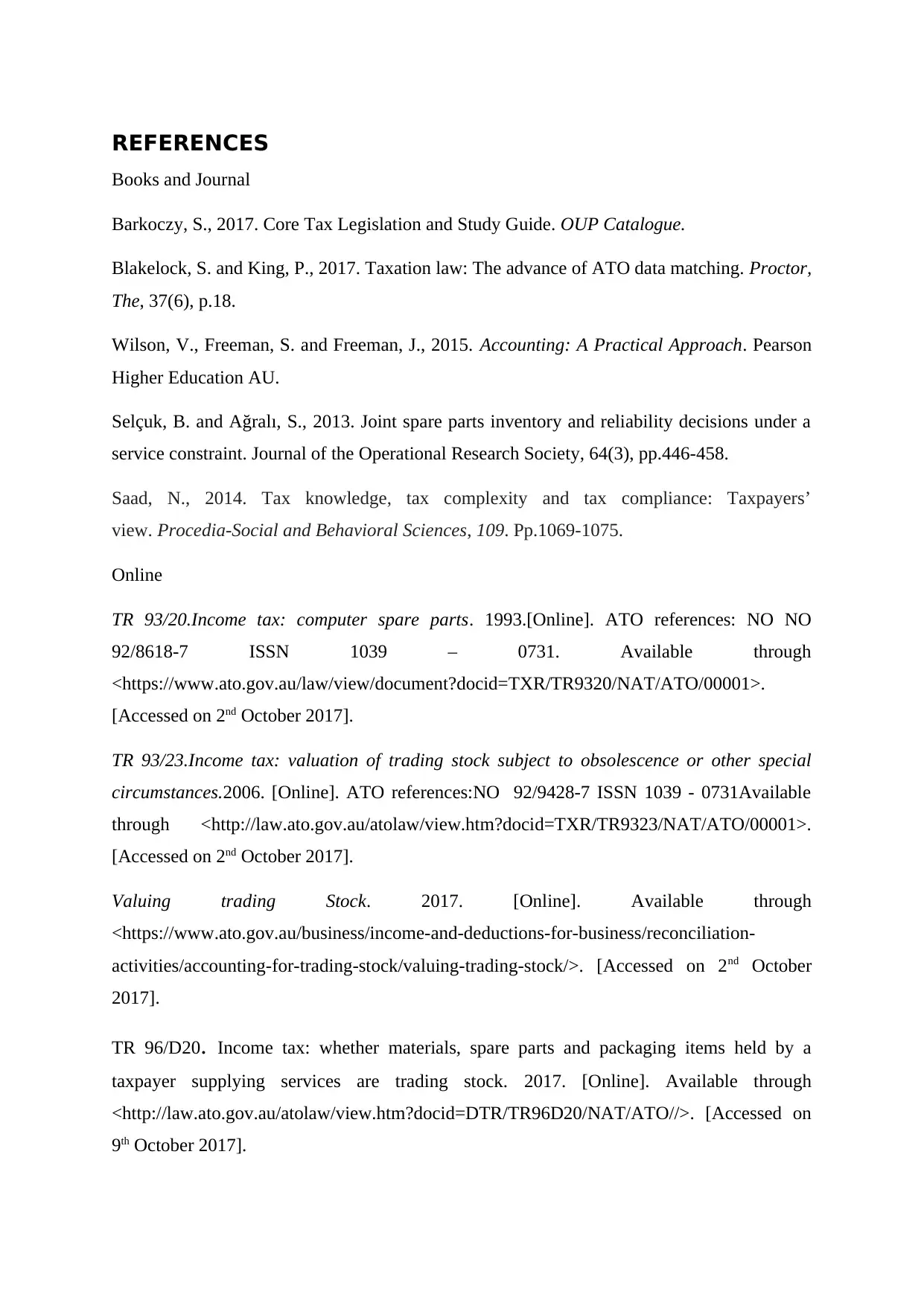
REFERENCES
Books and Journal
Barkoczy, S., 2017. Core Tax Legislation and Study Guide. OUP Catalogue.
Blakelock, S. and King, P., 2017. Taxation law: The advance of ATO data matching. Proctor,
The, 37(6), p.18.
Wilson, V., Freeman, S. and Freeman, J., 2015. Accounting: A Practical Approach. Pearson
Higher Education AU.
Selçuk, B. and Ağralı, S., 2013. Joint spare parts inventory and reliability decisions under a
service constraint. Journal of the Operational Research Society, 64(3), pp.446-458.
Saad, N., 2014. Tax knowledge, tax complexity and tax compliance: Taxpayers’
view. Procedia-Social and Behavioral Sciences, 109. Pp.1069-1075.
Online
TR 93/20.Income tax: computer spare parts. 1993.[Online]. ATO references: NO NO
92/8618-7 ISSN 1039 – 0731. Available through
<https://www.ato.gov.au/law/view/document?docid=TXR/TR9320/NAT/ATO/00001>.
[Accessed on 2nd October 2017].
TR 93/23.Income tax: valuation of trading stock subject to obsolescence or other special
circumstances.2006. [Online]. ATO references:NO 92/9428-7 ISSN 1039 - 0731Available
through <http://law.ato.gov.au/atolaw/view.htm?docid=TXR/TR9323/NAT/ATO/00001>.
[Accessed on 2nd October 2017].
Valuing trading Stock. 2017. [Online]. Available through
<https://www.ato.gov.au/business/income-and-deductions-for-business/reconciliation-
activities/accounting-for-trading-stock/valuing-trading-stock/>. [Accessed on 2nd October
2017].
TR 96/D20. Income tax: whether materials, spare parts and packaging items held by a
taxpayer supplying services are trading stock. 2017. [Online]. Available through
<http://law.ato.gov.au/atolaw/view.htm?docid=DTR/TR96D20/NAT/ATO//>. [Accessed on
9th October 2017].
Books and Journal
Barkoczy, S., 2017. Core Tax Legislation and Study Guide. OUP Catalogue.
Blakelock, S. and King, P., 2017. Taxation law: The advance of ATO data matching. Proctor,
The, 37(6), p.18.
Wilson, V., Freeman, S. and Freeman, J., 2015. Accounting: A Practical Approach. Pearson
Higher Education AU.
Selçuk, B. and Ağralı, S., 2013. Joint spare parts inventory and reliability decisions under a
service constraint. Journal of the Operational Research Society, 64(3), pp.446-458.
Saad, N., 2014. Tax knowledge, tax complexity and tax compliance: Taxpayers’
view. Procedia-Social and Behavioral Sciences, 109. Pp.1069-1075.
Online
TR 93/20.Income tax: computer spare parts. 1993.[Online]. ATO references: NO NO
92/8618-7 ISSN 1039 – 0731. Available through
<https://www.ato.gov.au/law/view/document?docid=TXR/TR9320/NAT/ATO/00001>.
[Accessed on 2nd October 2017].
TR 93/23.Income tax: valuation of trading stock subject to obsolescence or other special
circumstances.2006. [Online]. ATO references:NO 92/9428-7 ISSN 1039 - 0731Available
through <http://law.ato.gov.au/atolaw/view.htm?docid=TXR/TR9323/NAT/ATO/00001>.
[Accessed on 2nd October 2017].
Valuing trading Stock. 2017. [Online]. Available through
<https://www.ato.gov.au/business/income-and-deductions-for-business/reconciliation-
activities/accounting-for-trading-stock/valuing-trading-stock/>. [Accessed on 2nd October
2017].
TR 96/D20. Income tax: whether materials, spare parts and packaging items held by a
taxpayer supplying services are trading stock. 2017. [Online]. Available through
<http://law.ato.gov.au/atolaw/view.htm?docid=DTR/TR96D20/NAT/ATO//>. [Accessed on
9th October 2017].
Paraphrase This Document
Need a fresh take? Get an instant paraphrase of this document with our AI Paraphraser
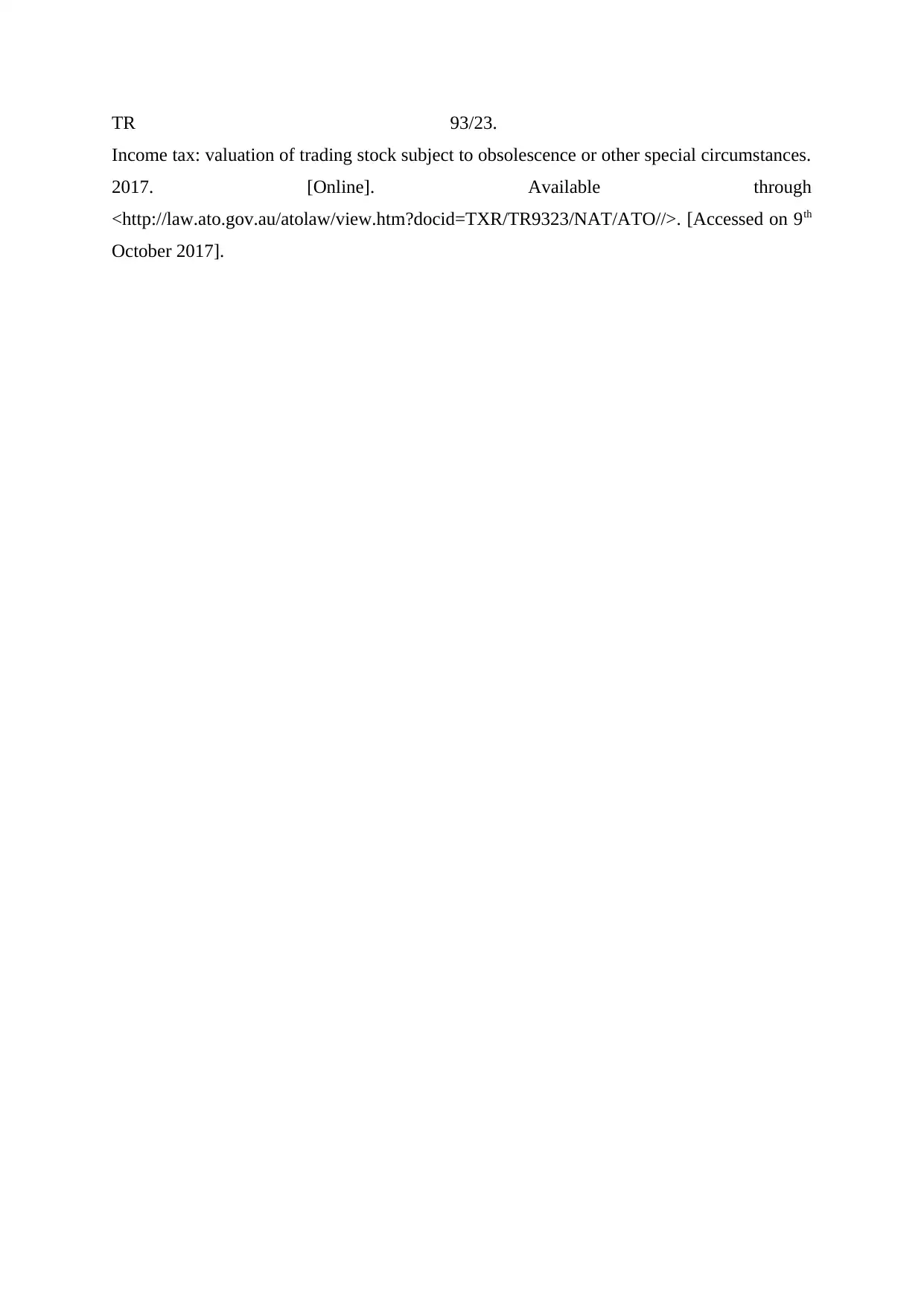
TR 93/23.
Income tax: valuation of trading stock subject to obsolescence or other special circumstances.
2017. [Online]. Available through
<http://law.ato.gov.au/atolaw/view.htm?docid=TXR/TR9323/NAT/ATO//>. [Accessed on 9th
October 2017].
Income tax: valuation of trading stock subject to obsolescence or other special circumstances.
2017. [Online]. Available through
<http://law.ato.gov.au/atolaw/view.htm?docid=TXR/TR9323/NAT/ATO//>. [Accessed on 9th
October 2017].
1 out of 8
Related Documents
Your All-in-One AI-Powered Toolkit for Academic Success.
+13062052269
info@desklib.com
Available 24*7 on WhatsApp / Email
![[object Object]](/_next/static/media/star-bottom.7253800d.svg)
Unlock your academic potential
Copyright © 2020–2026 A2Z Services. All Rights Reserved. Developed and managed by ZUCOL.





